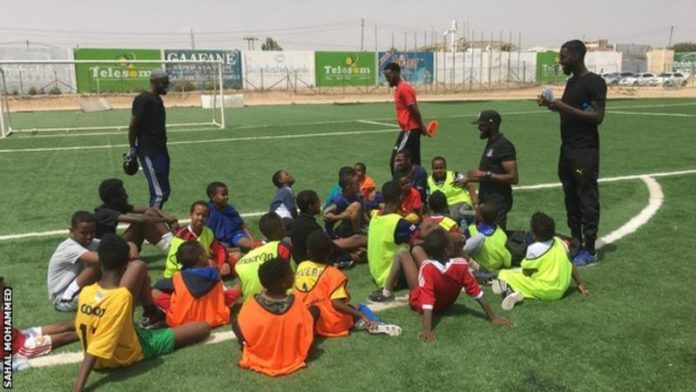Like most football-obsessed kids, those playing on the streets of Hargeisa dream of one day representing their country. The problem is their country, officially at least, doesn’t exist.
Somaliland has everything you expect from a country. Its people have Somaliland passports and pay with Somaliland shillings. The Somaliland flag flies in the Somaliland Parliament. The president was democratically elected in a “smooth and peaceful” election.
What it doesn’t have is a Fifa-recognised international football team or the means to maintain one. However, that is something four Britons of Somaliland descent are determined to change.
In February, Ahmed Ali and Mohammed Saeed, both 26, from Birmingham, joined Abdisalam Ahmed, 22, and Hussein Adan, 26, from London to establish the Somaliland Football Academy in their parents’ homeland.
“We think every young person should have the opportunity to play football,” Ali, a former community coach and scout for West Bromwich Albion and Cardiff City and now head of youth football and coach education in Somaliland, tells BBC Sport.
“In most other countries there’s already some sort of structure in place whereas here the challenge was to build everything from the bottom up. The thing that excited us most was literally starting from grassroots football to one day forming a national team.”
The quartet arrived with coaching backgrounds but to no facilities, no money and no players. As it is not a Fifa member, Somaliland does not receive international funding and its government, perhaps understandably, has other priorities.
“The four of us went to the sport ministry and said ‘look, we’ll do it for free. We’ll do the whole youth development and coach education courses,'” says Ali, who credits Ahmed Adare, the former justice minister and Somalia international, with helping to open doors.
“They said ‘go ahead, let us know if there’s anything we can help with. As long as it’s not money.'”
| The Somaliland ‘national’ team |
|---|
| Organised by London-based president Ilyas Mohamed, the Somaliland team played their first friendly fixture in 2014. A squad of mainly UK-based amateurs, including a PE teacher and hospital administrator, competed in the 2016 Conifa World Football Cup in Abkhazia, a partially recognised break-away region of Georgia. |
| Playing against other de facto nations, autonomous regions and minority peoples, Somaliland lost three of their four matches, finishing 10th out of 12. Their one victory was a 3-2 win over the Chagos Islands, a diaspora team representing the Chagos Archipelago in the Indian Ocean. |
| Though the squad included four players based in Somaliland, the government at the time claimed the team could not represent the ‘country’ and that the goal was to be accepted into Fifa. |
‘We had 140 kids turn up on a seven-a-side pitch’
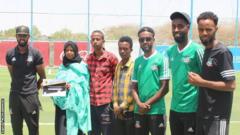
Cut off from international assistance, the average Somalilander lives on US$347 a year. One in 11 children do not survive to their fifth birthday and the average life expectancy from birth is 50.
In Hargeisa, Somaliland’s capital, camels and donkey-drawn carts merge in traffic with battered taxis.
Though it is attracting growing foreign investment, Somaliland is a place with plenty of challenges. Chief among them: proving it is a ‘real’ nation.
After gaining independence from Britain, Somaliland unified with Somalia in 1960. As Somalia fell into civil war, Somaliland re-declared independence in 1991. Ever since, as Somaliland has strived to show the world it is independent, the world has looked the other way.
Compared to Somalia, which suffers regular terrorist attacks, Somaliland is relatively stable and, though it may be poor, its people are proud.
Somalilanders will tell you their ‘country’ is in the Horn of Africa, bordering Djibouti, Ethiopia and Somalia, with a small (pirate-free) coast on the Gulf of Aden. Ask the United Nations, or any government in the world, and they’ll say Somaliland is an autonomous region in north-west Somalia.
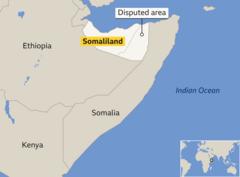
Somaliland’s presence in the football world is similarly hidden. An unofficial ‘national’ team plays in Conifa (the Confederation of Independent Football Associations), but draws largely on players from the roughly one-million-strong diaspora in areas including the UK, US and Scandinavia.
Until recently, the region roughly the size of Uruguay, with a population of 3.5m, also had no structure for youth football, but that too is being addressed by the Somaliland Football Academy.
From the academy base in Hargeisa, the four founders have self-funded travel across the country, training 132 coaches and recruiting 1,600 players.
“In the UK everything is set-up and you’re just there to deliver a coaching session, but here it was literally at zero,” Ali says. “There were a lot of kids playing football in the streets but there weren’t any organised teams.”
What wasn’t lacking was a passion to play.
“We once had 140 kids turn up on a seven-a-side pitch” Ali says. “You’d have one kid come and the week after he’d bring six friends, and then they’d bring 20 friends and before you knew it you’d have hundreds of little ones wanting to play.”
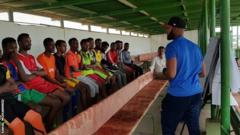
Adan, who moved to Somaliland in July 2017 and set up the All Star Sports Academy, now one of seven centres under Somaliland Football Academy, adds: “The country loves football. Tell someone a team and they will tell you about any player in that team,” Adan, who also works with schools to design and deliver physical education programmes, says.
“I was walking around the city and you see kids playing on street corners kicking around a bottle or socks wrapped into a ball.”
‘It is about giving them hope’
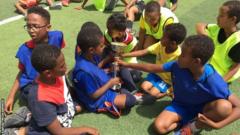
The academy has relied on donations. West Brom gave training equipment and a delivery from KitAid means somewhere in Somaliland youngsters are proudly wearing last season’s Port Vale and Walsall shirts.
With astroturf pitches scarce and expensive, they have also had to be creative finding places to play, often utilising disused patches of dusty land.
“The boys will come to a pitch before the session and sweep the place to make sure there aren’t any bricks or rocks. It’s helped us – one, by not having to pay for facilities and two, the players put a bit of care into their local area,” Ali says.
Within a year, the academy has established national leagues for boys at Under 13, 15 and 17 level. They also want to develop football for women and, at a recent girls’ tournament, the Vice-President congratulated the winning team.
The academy works closely with Lions Gate, a sports centre set up by another Brit, Mohammed Yusuf, in one of Hargeisa’s poorest areas. Established to combat gang violence, Lions Gate has trained former gang members to be coaches, referees and ground staff.
Youth unemployment is high and many Somalilanders attempt the dangerous journey to Europe via Libya. One Unicef-funded study found those emigrating were typically young men, some as young as 14, and “abuse and death are common”.
“We’ve had mothers crying and hugging us because we stopped their boys from trying to emigrate. We gave them hope and something to look forward to and we didn’t even know it,” Ali says.
“For some, coaching is about developing players to play in the Premier League but for us it’s about giving them hope to keep going and not give up.”
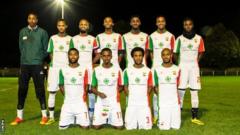
Recognition from Fifa seems unlikely but would not be without precedent. The organisation has 211 members, 18 more than the United Nations. In 2016, Gibraltar and Kosovo became Fifa’s latest additions. Both have since claimed victories on the pitch, even if political recognition off it is missing.
Instead, the academy is focused on recruiting and training more players and coaches, with the aim to build elite youth teams at Under 15 and Under 17 level.
The academy founders have seen enough talent to believe the place that claims Mo Farah as its own (his family live in Somaliland) can have a positive future on the pitch – if given the chance.
“Ninety-nine per cent of the players here are physically good. They can run and technically they are good because they have played a lot of street football.
“I think you can compare it a lot with the favelas in Brazil. There’s a lot of raw players, there’s a lot of raw talent, but they need a lot of coaching to fulfil their potential.”
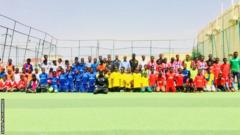
A team allowed to compete against other ‘nations’, even at youth level, could boost Somaliland’s bid for international acceptance.
“We are trying to gain recognition and sport is the best way,” Adan says. “If I ask people in Somaliland ‘what’s the capital city of Egypt?’ many can’t answer. But if I ask ‘who’s the best player from Egypt?’ they’ll tell you ‘Salah’ immediately.
“Football is an international language and if we were producing talented players and they were making noise on the international stage, that would do Somaliland the world of good.
“The people of Somaliland are so passionate about their country. If there was a group of people representing Somaliland on the international stage, it wouldn’t just be for the young people, it would be for everybody.
“I hope one day it does happen, but we’ve got a long way to go.”
BBC

















